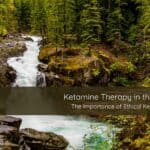Ketamine Therapy in the Public Eye: Why Ethical Use Matters More Than Ever
Whenever ketamine makes headlines—whether through celebrity disclosures, tragic stories, or cultural debates—the conversation often leans toward sensationalism rather than substance. These moments are important opportunities to pause, step back, and look at what ketamine truly is, how it works, and why responsibility and ethics must guide its use.
At The Catalyst Center, we specialize in ethical ketamine therapy, also called ketamine-assisted psychotherapy (KAP). We know these substances can be powerful agents of healing—but only when used within the right therapeutic framework.
Psychedelics as “Nonspecific Amplifiers”
 Psychedelic pioneer Dr. Stanislav Grof described psychedelics as “nonspecific amplifiers.” This phrase highlights a central truth: psychedelics don’t create new content in the psyche—they magnify what’s already there.
Psychedelic pioneer Dr. Stanislav Grof described psychedelics as “nonspecific amplifiers.” This phrase highlights a central truth: psychedelics don’t create new content in the psyche—they magnify what’s already there.
Whether joy or trauma, clarity or confusion, these experiences can all surface in an amplified way. In therapeutic settings, this amplification is carefully supported. Clients are screened to ensure KAP is appropriate and safe, with clear criteria and precautions in place. Ketamine-assisted therapy is more than taking a medication—it’s a comprehensive process grounded in preparation, guided experience, and skilled integration.
The Role of Therapeutic Integration
During a ketamine session, people often access subconscious material—emotional memories, motivations, and sometimes profound spiritual insights. These moments can be life-changing, but they can also be destabilizing without guidance.
That’s where integration comes in. With the support of a trained therapist, clients can process and make meaning of what arises. Integration allows the experience to translate into healthier perspectives, deeper self-understanding, and actionable steps for healing. Without it, psychedelic use risks becoming confusing, overwhelming, or even harmful.
The Dangers of Spiritual Bypass
 Psychotherapist John Welwood coined the term spiritual bypass to describe using spiritual practices to avoid unresolved psychological pain. In ketamine work, this can show up as grandiosity, self-importance, or even delusions of being on a divine mission—without doing the deeper emotional work that true healing requires.
Psychotherapist John Welwood coined the term spiritual bypass to describe using spiritual practices to avoid unresolved psychological pain. In ketamine work, this can show up as grandiosity, self-importance, or even delusions of being on a divine mission—without doing the deeper emotional work that true healing requires.
This is especially concerning for individuals already prone to narcissism, impulsivity, or distorted beliefs. Psychedelics, including ketamine, can amplify these traits, sometimes leading to destabilizing or harmful behaviors.
The Public Impact of Psychedelic Misuse
When influential figures publicly share their psychedelic use, their narratives ripple far beyond their own lives. For those with significant power—whether celebrities, leaders, or entrepreneurs—the risk is that amplified states of grandiosity can reinforce unhealthy belief systems, with consequences that extend to families, communities, or even broader cultural norms.
This isn’t just a “celebrity issue.” On a smaller scale, unsupported psychedelic use can destabilize families, disrupt workplaces, and perpetuate cycles of psychological harm. Without proper structure, what begins as curiosity or self-exploration can lead to trauma rather than healing.
A Call for Responsible, Ethical Practice
At The Catalyst Center, we believe ketamine therapy must always be grounded in responsibility, humility, and respect—for the medicine, the psyche, and the people we serve. Our approach includes:
- Comprehensive screening to determine safety and appropriateness.
- Preparation sessions to build trust and readiness.
- Monitored sessions in a supportive therapeutic environment.
- Integration therapy to help clients make sense of and embody their insights.
Ketamine is not a quick fix. It is a powerful tool that, when held within a strong therapeutic container, can foster deep healing, resilience, and transformation.
As ketamine continues to appear in the public eye, our responsibility as clinicians and informed community members is clear: to provide clarity, context, and ethical guidance. Only then can these medicines be used for what they are truly capable of—supporting meaningful, lasting growth.
Interested in exploring Ketamine Therapy?
Contact The Catalyst Center to learn more about our KAP offerings.
Call schedule a free introductory call or contact us.




